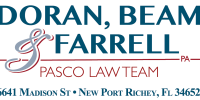Safe Driving Tips For Rainy Downpours
Thursday, September 22, 2022 12:00 AM

Drivers in Florida deal with heavy rainfall each year. From mild drizzles to heavy rainstorms, precipitation can quickly change driving conditions, causing them to become hazardous. Use safe driving techniques to avoid accidents when rain is forecasted.
Rain Increases Driving Risks
Precipitation directly impacts visibility and roadway friction. When combined with wind and deteriorating roads, rain creates the perfect storm for accidents. Based on ten-year data, the National Highway Traffic Safety Administration (NHTSA) indicates that wet pavement is responsible for 16% of all accidents (73% of those involving weather), and rain contributes 10% to accidents (46% involving weather).
If you’ve lost visibility during a heavy downpour or hydroplaned on a wet road, you’re familiar with the unpredictable nature and dangers of driving in the rain. However, by using safe driving skills, you can prepare for the unexpected and minimize risks.
Tips For Rainy Day Driving
These safe driving tips are crucial to remember every time you turn on your windshield wipers and head out on the wet roadway.
- Make sure your headlights are working. According to Florida law, drivers should immediately turn on their headlights and windshield wipers in rainy conditions. Check and turn on your automatic headlights when using windshield wipers.
- Do not use hazards. Although drivers often use this tactic during heavy downpours, Florida prohibits them from using it. According to current laws, drivers should only use hazard lighting on disabled or stopped vehicles. To minimize collision risks, keep your headlights in good condition and follow other safe driving habits.
- Take your time. Don’t drive the same way as you would under normal weather conditions. Leave enough following distance between yourself and other vehicles. If you feel unsafe driving, move to the right lane as soon as possible; do not stop on the road. Exit the roadway and wait for the storm to pass in a parking lot or secure area.
- Be cautious with standing water. Puddles can be misleading. Hydroplaning can occur in a few inches of water, while deeper pools of water could cause your vehicle to become immobile. Err on the side of caution – if you encounter standing water, consider another route.
- Go easy on your accelerator and brakes. If your vehicle is skidding, don’t slam on the brake. Instead, focus on safely steering your car out of harm’s way. To improve traction and decrease the chance of skidding, accelerate slowly from a standing stop.
- Focus your attention on the road. Give your full attention to driving during heavy rains or high winds. Turn off the radio, use both hands on the steering wheel, and concentrate on the road ahead. Drivers must feel and control their vehicle’s movements to react appropriately to road conditions.
- In low visibility situations, pull over. You could collide with pedestrians or other vehicles if you cannot see what’s ahead of you due to heavy rains. If the rainfall affects your vision, use your best judgment and pull into a secure area.
- Pay attention to other drivers. Keep to the right and allow plenty of room for movement. If necessary, use the horn to signal your presence.
- Maintain your vehicle. Make sure your vehicle receives regular maintenance to improve traction, windshield wiper performance, and overall control. A driver can only do so much to compensate for threadbare tires and rotted windshield wipers.
Even the most skilled driver can be affected by rain, wind, or other weather conditions. Use these safe driving tips to your advantage during inclement weather and hazardous road conditions.
Attorneys You Can Talk To!
Accidents happen, and when they do, you and your family will have questions about your rights and their impact on your life. The attorneys at Doran, Beam & Farrell, PA, understand your concerns and are ready to answer any questions or address concerns that you may have about your claim.
To schedule a FREE consultation, call or text us at (727) 846-1000 or complete our online contact form.
Sources
https://www.avanteinsurance.com/driving-safely-in-wet-weather-tips-for-florida-drivers/
https://driving-tests.org/beginner-drivers/how-to-drive-in-rain/
https://blog.cinfin.com/2022/03/22/drive-in-rain/
This article will explain what you can expect during an initial consultation, and how to get maximum benefit from it.
The Initial Consultation
An initial consultation is the first meeting between you and a potential attorney, and is designed to help you and the attorney decide if you want to move forward as attorney and client. You might consult with more than one attorney before you make your final decision.
An initial consultation enables you to discuss the facts of your case with an attorney. You will also be able to ask them questions about your case, including how they would address different issues of your case. Consider it a mutual fishing expedition — you are interviewing the attorney, and the attorney is interviewing you. Do they specialize in your type of case? Do your personalities mesh? What is your gut reaction?
What You’ll Talk About
As the attorney-client relationship is yet to be agreed to, initial consultations are limited in scope. However, the auto accident attorney will listen to the details of your case. Based on the law and the information you provide, the attorney will let you know if your claim is legitimate, and if an attorney is even required. (This determination is typically based on the likely damages they think you can recover versus the cost of hiring an attorney.) Furthermore, the attorney will let you know if they handle your type of case or if you need to talk to another attorney. (At this point, they might give you a referral.) Finally, the initial consultation includes an overview of attorney fees, including the payment arrangement (i.e., contingency, flat fee, or hourly).
If, during the consultation, you don’t feel the attorney is the right fit, you can simply walk away and pursue other options. However, if you are convinced the attorney is the right fit for your case, you will sign an engagement agreement to formally acknowledge the relationship.
Be Prepared
It doesn’t just work for Boy Scouts. You need to be prepared to get the most out of an initial consultation. There are two primary goals that you and the attorney will want to accomplish:
• To learn more about your case.
• To determine if this attorney is the right fit.
To help the attorney learn more about your case, you’ll need to provide relevant documents. These might include contracts (if your claim arose from a contract dispute, bring copies of the contract and any documents explaining the contract); relevant police or accident reports; deeds to property (if your claim involves a property dispute, bring a copy of the deed or any documents relating to the property); other documents (provide other documents that show any evidence of damages, such as medical records or expenses, or any warranties or communication created by the party you are trying to sue). Finally, be prepared to answer any questions the attorney might raise about your circumstances.
Pasco Attorneys You Can Talk To
Accidents happen, and when they do, you and your family will have questions about your rights and their impact on your life. If you’ve been injured in an accident, the auto accident attorneys at Doran, Beam & Farrell understand your concerns and are ready to answer any question or address any concerns that you may have about your claim.
To schedule a FREE case evaluation, call or text the Pasco attorneys at (727) 846-1000 or complete our online contact form at pascoinjurylaw.com/contact-us.


